- Home
- Steve Vernon
Do-Overs and Detours - Eighteen Eerie Tales (Stories to SERIOUSLY Creep You Out Book 4)
Do-Overs and Detours - Eighteen Eerie Tales (Stories to SERIOUSLY Creep You Out Book 4) Read online
Do-Overs
And
Detours
-
Eighteen Eerie Tales to
SERIOUSLY
Creep You Out!
By Steve Vernon
Introduction by Richard Chizmar
Stark Raven Press
If you enjoyed reading this collection PLEASE take a moment to leave a short review on Amazon.
What People Are Saying About Steve Vernon
"If Harlan Ellison, Richard Matheson and Robert Bloch had a three-way sex romp in a hot tub, and then a team of scientists came in and filtered out the water and mixed the leftover DNA into a test tube, the resulting genetic experiment would most likely grow up into Steve Vernon." – Bookgasm
"Steve Vernon is something of an anomaly in the world of horror literature. He's one of the freshest new voices in the genre although his career has spanned twenty years. Writing with a rare swagger and confidence, Steve Vernon can lead his readers through an entire gamut of emotions from outright fear and repulsion to pity and laughter." - Cemetery Dance
"Armed with a bizarre sense of humor, a huge amount of originality, a flair for taking risks and a strong grasp of characterization - Steve's got the chops for sure." - Dark Discoveries
“Steve Vernon is a hard writer to pin down. And that’s a good thing.” – Dark Scribe Magazine
"This genre needs new blood and Steve Vernon is quite a transfusion." –Edward Lee, author of FLESH GOTHIC and CITY INFERNAL
“Steve Vernon is one of the finest new talents of horror and dark fiction" - Owl Goingback, author of CROTA
"Steve Vernon was born to write. He's the real deal and we're lucky to have him." - Richard Chizmar
Steve Vernon – I Knew He’d Be Back (an introduction by Richard Chizmar)
Do-Overs and Detours is a very good book. Something I don’t see nearly enough of these days. All eighteen short stories included are GOOD, some VERY GOOD, and a handful that tiptoe right over into the fabled territory of GREAT.
Give “A Fine Sacrifice” a close read and you will see what I mean. It is lean and mean and one of the hardest hitting stories I have read in a very long time.
Trust me – it’s a GREAT story.
When you have recovered from “A Fine Sacrifice” (and you WILL need to recover), flip a few pages over to “Tinselled Trailer-Court Viscera”. This one is just plain weird – in fact, it reads a little like Joe Lansdale on crack, which is a very good thing to my mind. I wouldn’t call it a GREAT story but it is a DAMN GOOD ONE and I did not want it to end, which for me is the greatest compliment I can offer another writer.
And that is pretty much how I can summarize my entire experience with Do-Overs and Detours. I did not want it to end. I wanted more stories like “Hyperactive Cleaning Power” – just a short-short but packed with enough wonder and grace for a novella twenty times its length; and “The Takashi Miike Seal of Approval” , a nasty little slice of brutality but with enough heart to make you care; and “Rolling Stock”, a rural tall tale best read around a blazing campfire.
You see, there is something for everyone in these pages. A little crime, a little horror and a little fantasy and a lot of weirdness, and a whole lot of wisdom, and most importantly a WHOLE lot of fine writing by Steve Vernon.
How many of you have noticed that I had not even mentioned Steve’s name until now? I don’t think Steve would mind, either. He is not the kind who writes so that he can tell others that he is a writer. He is not the kind who writes for attention or notoriety. If he was, I would not be carrying around in my pocket the funny little story I am about to tell you regarding Steve.
Steve Vernon writes because he has to.
He is the kind of writer who knows the secret formula to good writing – which is that there is NO secret formula, ladies and gents. You just sit your butt down and you DO the work. Steve Vernon does the work and then some. That’s how I know that he would not mind that I did not even mention his name until page two of the introduction – because Steve knows that the stories are what is important.
So – how do I know all that about Steve Vernon, someone that I have never met in the flesh or even spoken to on the telephone?
Let me tell you a story and then I think that you will understand.
Way back in the late 1980’s, I published “Mongrel”, a nifty little story by Steve Vernon in the pages of Cemetery Dance magazine. Readers dug it and I believe that it got a fair amount of good press.
Almost ten years later I selected “Mongrel” to appear in a massive hardcover collection entitled The Best of Cemetery Dance, along with stories by such genre giants as Stephen King, Joe R. Lansdale, Jack Ketchum, Dean Koontz and Norman Partridge.
It was an easy pick for me. It did not matter that Steve Vernon wasn’t a household name like many of the other writers. It did not matter that I had not heard from or published Steve Vernon in many, many years.
It was a damn good story and deserved to be in the book.
But I had a problem.
You see, I could not find Steve Vernon anywhere. I tried to track him down to send him contracts and a check but I had no luck. He had vanished like smoke on the wind.
So I could not very well publish his story in that collection, now could I?
You are damn right I did.
And here’s why.
I knew that he would be back.
I knew that wherever Steve Vernon was and whatever it was that he was doing that he would eventually resurface and would eventually start publishing again.
At first, it appeared that I was wrong.
A few years passed and I did not hear a word from Steve Vernon.
Nor did anyone else.
But it did not matter.
I held onto my stubborn belief that Steve would resurface year after year – until finally I was proven right.
I do not remember if was by letter or e-mail but I know that I eventually heard from Steve and he was as pleased as punch that I had reprinted the story and the very first thing he said was “Thank you.” and the very second thing he said was “Where is my check?”
You see?
I told you Steve was a writer.
Anyway, the moral of this little side story is pretty simple. I knew he would be back because you can tell by reading just a handful of Steve Vernon stories that he was born to write. He’s the real deal and we are lucky to have him.
- Richard Chizmar
Richard Thomas Chizmar (born 1965) is best known as the publisher and editor of Cemetery Dance magazine and the owner of Cemetery Dance Publications. He also edits anthologies, writes fiction, produces films, writes screenplays, and teaches writing and is a heck of a good guy.
Hyperactive Cleaning Power
I sat in the laundromat staring at an empty dryer, waiting for my wash to turn. The morning moved as slowly as a fossilized sloth. My cigarette burned down to nothing and I was all out of matches.
The attendant sat behind a counter with his head turtled into a half dozen folds of shoulder fat, resignation and Jello-ish jowls. He was watching summer rerun soap operas on a dangling portable television that received a signal from somewhere south west of the twilight zone. He sat there perfectly still like a toad waiting for a wandering fly. He was either having a deep solitary religious experience or a really quiet bowel movement.
My rooming house had no washing machine. I used to live in an apartment building with a laundry room. I used to have a job in the upstanding growth industry of interne
t sex drugs.
I used to have a cat.
I even used to have a girlfriend.
Now, nothing. A state-of-the-art spam filter had downsized my job. My cat jumped after a pigeon through my boarding house window, straight into the neighbor’s rottweiler pen. My girlfriend left me for a male stripper. She said she dug his uniform.
It could be worse. I could be that old woman coming through the door, clattering an empty shopping cart across the laundromat’s tile floor.
The fat man stared at his out of date soap opera like the mood ring of Jesus. The channel wasn’t changing and neither was he.
I looked at the woman, seeking perspective. The picture didn’t improve much. I figure she’d leaned on that poverty walker for so long her hands had rusted into handle grips. Her wrists had hollowed into liver spotted aluminum conduit, conducting each clank of cart wheel over concrete.
Yup, life could always be worse.
Maybe it would be. Maybe that’s me I’m looking at, a dozen years down the road, just a poor mad bastard, walking and talking to himself.
“Christ.”
Did I say that aloud? Am I talking to myself already? I'm doomed. I ought to climb into a dryer, plunge the quarters home and let the big hot wind tunnel centrifuge my brains into a gently warmed gray jelly soup.
She looked at me and grinned. Her eyes glinted like yellow glass marbles under a switchblade sun. I wondered just how long have she had mapped and strained her life through the meshwork of that cart? How many miles had the sidewalk unrolled beneath that rusty tin plated grid-work? Her eyes rolled back, gazing heavenward at the tilting fan blades softly scything the ceiling, sending a prayer to the patron saints of St. Jude, Quixote and Ed Mcmahon. Then she brushed an untameable lock of barbed wire hair, as white as a distant Arctic snow bank and slipped me a wink. Or maybe there was something in her eye.
I didn’t say a thing.
She opened the door to a dryer and began emptying her cart, unloading pieces of carefully folded nothing, her hands fluttering as delicately as crystal doves; mouthing smothered prayer words. Her litany fell, regret by regret, as softly as white rose petals on a moonlit funeral.
"This is my daughter, who swears I died in a plane wreck."
A breath.
"This is my husband, who fell from a wooden scaffolding and crashed to the earth like a fallen saint. He wasn’t."
A breath.
"This is the dog I used to own and the cats I feed and the pigeons and the crows and the worms."
Another breath.
Piece by piece of nothing at all, she loaded it all into the dryer. She fished into her pocket. It took so long to find, a long ache of frozen torpor, suspended in snail breath and a gargle of slowly drying senility.
She dragged out three quarters and fit them into the slots. She needed one more quarter to buy her time.
“Excuse me,” she said, her voice as dry as dusty folded newsprint. “Can you give me another quarter?”
Give. I liked the way she said that. Give, not loan. There was no lie, no deceit in her words. She asked for an honest to god hand out. I respected her honesty. Even though I had no idea how I’d pay this month’s rent, even though tonight’s groceries were a wet dream fantasy, I handed her the quarter. Why not? Beggar’s luck works powerful magic. It might bring me good karma. What else was a quarter good for?
She slammed the slide home. The machine rolled into life. She leaned her face against the dryer door, watching the emptiness go around, a square eyed child staring at a forever cartoon.
I looked closer.
She kept staring as the dryer window of never-never turning like a glass-eyed dervish. A soft eerie light strobed across her features, angels and sunflowers pissed cotton candy sunshine feathers across her yellow hair.
Wait a minute.
Wasn’t her hair white a moment before?
I looked closer. I could see it now, her hair turning the shade of a July wheat field. A color like sunburned straw, soft and golden, the white fading away like yesterday’s melting snow.
What was happening?
The wrinkles skinnied off her cheeks like restless wireworms. Age spots scuttled like cockroaches before the dawn. The years fell away, one by one, with each empty barreled spin. Time evaporated.
No one seemed to notice. The fat man stared at his idiot talking box. I looked at the television. I saw reruns, running in reverse. I saw Alan Alda, in army greens and a Hawaiian shirt, looking concerned. I saw a helicopter rising; a nurse, running backwards downhill. Painless is suicide.
The old woman looked straight at me. She looked to be a hot looking 42, half the age she’d started at. She threw me another wink that was half kiss and half giggle. My heart tasted of ash and forgotten love songs. She turned back, the years spinning away, middle age, teenage, puberty, down and down until she’s nothing but a small girl about thirteen years of age.
The machine stopped spinning.
The attendant stared at a floor wax commercial, unrolling backwards.
The little girl curtsied like I was some kind of royalty. She curtsied, bobbed a quick little nod of her head and ran skipping out to the sidewalk and gone. Her footsteps echoed, happy gunshots straight through my heart. The fat man looked up from his television. He smiled like a grotesque Buddha and winked.
"It's your turn."
I stared at the empty shopping cart.
I fumbled in my pocket for four more quarters. I slid the silvery quarters home and waited for the dryer to turn.
A Fine Sacrifice
Sam could see the two older men, Will and Artie, standing together on Will’s front porch like a pair of well-trained watch dogs. Their two boys played catch with a battered baseball out in Will’s field.
It’s a good field, thought Sam. Will really ought to plant something in it.
Sam knew Will’s reasons for letting the field run to fallow. Still, it was a good field; deep and fertile and far from the public eye. Will’s grandfather had won the land in a poker game and had closed the deal in the knife fight that ensued afterwards. The original owner, drunk on too much stump liquor, had pulled a hunting knife from his belt and demanded his deed back. Will’s grandfather, or so the story is told, broke the man’s arm and took the knife from him and promptly gave it back, blade first.
Will had told Sam the tale one night while roaring drunk. The evening stood out in Sam’s memory not only for the story but for the fact that Will was drunk enough to tell it, for though Will often drank like a fish he rarely allowed himself to get good and tanked. Will didn’t care much for losing control.
Will had gone so far as to show Sam the actual deed. It was still stained with its original owner’s blood. When Sam asked him why he never planted anything in the field, Will looked straight at him, suddenly sober.
“You really want to plant something else out there, Sam?” Will clapped him on the shoulder. “I think we’ve planted more than enough out there for now, don’t you?”
Sam had shut up. He knew Will was right. Will was always right.
“Can I go play, Dad?” Asked Samuel.
Sam startled from his memory and smiled at his son who had glided up behind him so quietly Sam hadn’t even heard his approach.
“Sure, run and be a kid,” Said Sam. “Let your old man worry about being a grown up.”
Young Samuel ran off towards the other two boys, only too eager to leave the oppressive pall of his father’s shadow. Sam heaved a sigh after him, then turned and continued towards Will’s front porch.
He’s going to ask me, Will thought. My Jesus, I just know that he is going to ask me.
The porch looked like a ransacked locker room with at least a half dozen baseballs and bats scattered about. Both the men wore baseball caps and if Sam hadn’t known better he’d have sworn that the darkest thing the two had to think about was whether or not their favorite team would win the World Series.
Will leaned heavily upon his own favorite bat. It
was a Louisville Slugger, weighted heavy for most men but in Will’s hands it swung as light as a willow wand. He was a big stocky man but it wasn’t just his size that impressed people. It was his air of absolute capability. Will looked like the kind of a man who could build a house, fix a car, plant a field, hunt a bear and sleep with just about any woman he chose. Will was an alpha male. A man’s man and he carried himself like he knew it.
Artie was more Sam’s size and looked like the accountant he was. He stood in Will’s shadow, back by the beer cooler. Both men had bottles in their hands. As Sam drew nearer Will nodded and said something to Artie, who without warning scooped up a ball and drilled it in Sam’s direction. Sam wasn’t wearing a glove, but he caught the hard-chucked ball just the same. It was expected of him.
He managed to grin against the stinging pain.
“That the best you can do?” Sam asked gamely.
Will took a swallow of beer, his eyes never leaving Sam’s.
“Best he can do,” Will answered, nodding derisively towards Artie.
Artie just shrugged. He was technically the better pitcher of the pack of them but it was an honest fact that he couldn’t match Will for sheer power.
Will stared up at the sun as if it were a clock.
“You’re late,” He said in Sam’s direction.
Sam looked up at the sun. It just looked like a big-assed ball of burning gas to him. He wondered if Will could really tell the time by the sun or if it were all for show. With Will you never quite knew for sure. That was part of his magic.
Will grinned and it made him look mean. He had a face like a ring-seasoned boxer. His eyes looked like hard narrow gun sights. He always reminded Sam of a surly Robert Mitchum. Will claimed to have been a Navy Seal as a young man and although both Sam and Artie couldn’t swim a stroke, neither dared to say differently.
You just never could tell with Will.
Artie looked up at the sun and nodded but Sam wasn’t fooled. He knew Artie was just following Will’s lead.

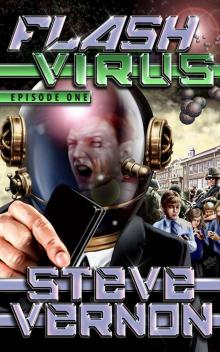 Flash Virus: Episode One
Flash Virus: Episode One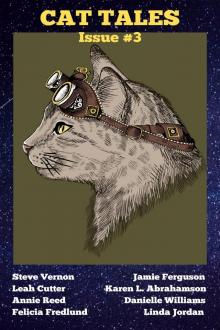 Cat Tales Issue #3
Cat Tales Issue #3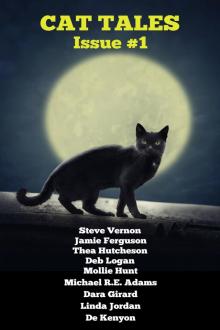 Cat Tales Issue #1
Cat Tales Issue #1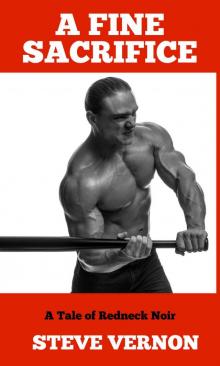 A Fine Sacrifice
A Fine Sacrifice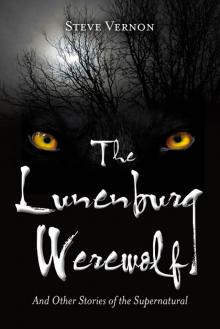 The Lunenburg Werewolf
The Lunenburg Werewolf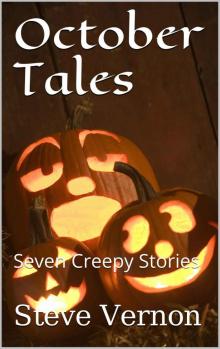 October Tales: Seven Creepy Stories (Stories to SERIOUSLY Creep You Out Book 1)
October Tales: Seven Creepy Stories (Stories to SERIOUSLY Creep You Out Book 1)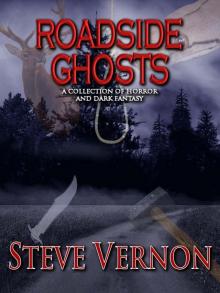 Roadside Ghosts: A Collection of Horror and Dark Fantasy (Stories to SERIOUSLY Creep You Out Book 3)
Roadside Ghosts: A Collection of Horror and Dark Fantasy (Stories to SERIOUSLY Creep You Out Book 3) Haunted Harbours
Haunted Harbours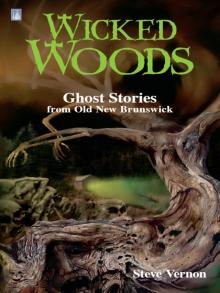 Wicked Woods
Wicked Woods Two Fisted Nasty: A Novella and Three Short Stories (Stories to SERIOUSLY Creep You Out Book 2)
Two Fisted Nasty: A Novella and Three Short Stories (Stories to SERIOUSLY Creep You Out Book 2)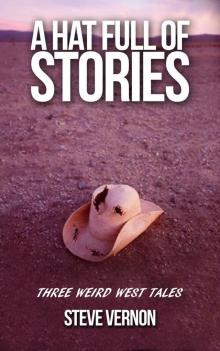 A Hat Full of Stories: Three Weird West Tales (Stories to SERIOUSLY Creep You Out Book 9)
A Hat Full of Stories: Three Weird West Tales (Stories to SERIOUSLY Creep You Out Book 9) Bad Valentines: three twisted love stories (Stories To SERIOUSLY Creep You Out Book 7)
Bad Valentines: three twisted love stories (Stories To SERIOUSLY Creep You Out Book 7)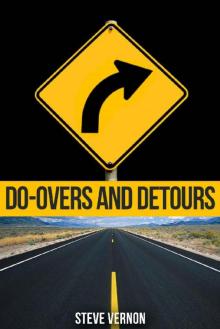 Do-Overs and Detours - Eighteen Eerie Tales (Stories to SERIOUSLY Creep You Out Book 4)
Do-Overs and Detours - Eighteen Eerie Tales (Stories to SERIOUSLY Creep You Out Book 4) Tales From The Tangled Wood: Six Stories to SERIOUSLY Creep You Out
Tales From The Tangled Wood: Six Stories to SERIOUSLY Creep You Out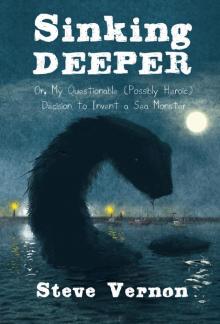 Sinking Deeper
Sinking Deeper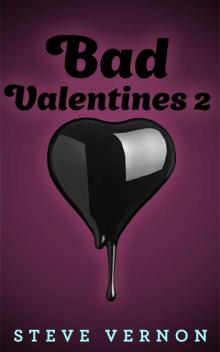 Bad Valentines 2: Six Twisted Love Stories (Stories to SERIOUSLY Creep You Out Book 5)
Bad Valentines 2: Six Twisted Love Stories (Stories to SERIOUSLY Creep You Out Book 5)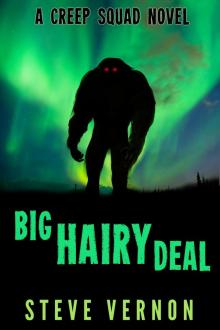 Big Hairy Deal
Big Hairy Deal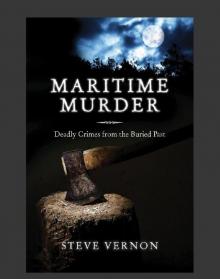 Maritime Murder
Maritime Murder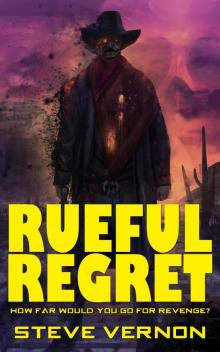 Rueful Regret
Rueful Regret